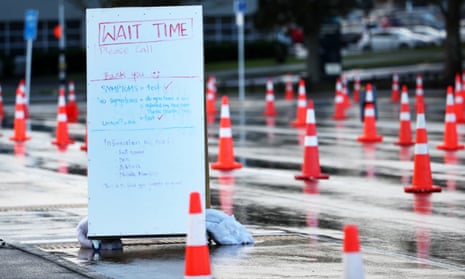New Zealanders are experiencing more depression and anxiety since the coronavirus lockdown, doctors say, despite the country leading the world in its battle against the pandemic.
New Zealand has been lauded for its effective management of the virus, with most Kiwis returning to their normal routines following a strict seven-week lockdown in April and May. A recent outbreak in Auckland has now largely been contained.
But GPs working on the front line say “generalised anxiety” is proliferating in the community, and putting a strain on mental health services that are already overburdened.
Dr Bryan Betty, the medical director of the Royal New Zealand College of General Practitioners, said cases of depression and anxiety have risen “substantively” in the wake of the lockdown, and there was anecdotal evidence that more prescriptions were being issued for anti-depressant and anti-anxiety medication. Sleep problems have also been widely reported.
In his own practice, Betty said he was seeing a 15-20% rise in need for psychiatric help, and this was putting a strain on an already dysfunctional system.
“Access to specific mental health support like psychologists and psychiatrists working in the community is really limited in New Zealand, it’s really difficult,” said Betty. “Mental health has been an ongoing issue for years now, so this [Covid] has really come in over the top and exacerbated these longstanding issues.”
Pre-Covid, 25% of GP consultations nationwide featured “some sort of mental health component”, Betty said, and with GPs often “the barometer of what’s going on in society”, he was sounding the alarm.
“There is definitely a sense of fatigue. It’s not just from the patients, but it’s with GPs and frontline workers, I have never quite seen the degree to which they are starting to get fatigued about the volume of work,” Betty said. “I am really concerned about that.”
Fiona Bolden is the chair of the Rural General Practice Network and has been a rural GP for 25 years.
She said more people have been presenting with anxiety post-lockdown, and the pandemic had been a double whammy for rural communities, already dealing with drought and a lack of access to vital foreign workers, now banned from entering the country.
“We’re starting to see long waiting lists [for specialist services]. People are really distressed, particularly the elderly,” said Bolden. “They have been cut off and they’ve been made to feel vulnerable when they didn’t feel vulnerable before.”

Dr Jo Scott-Jones runs a GP practice in the small Bay of Plenty town of Opotiki, and described the rising levels of community distress as “slow-motion bullet-dodging”.
“What we’re seeing after lockdown is a lift in general anxiety,” said Scott-Jones. “So people are less tolerant of family relationships, or situations at work. So stress in general is causing more distress.”
Last year the Labour government committed a record amount to mental health care, with New Zealand experiencing some of the worst mental health outcomes in the OECD, including the second highest rate of youth suicide.
A landmark 2018 inquiry found New Zealand’s mental health services are “overwhelmed” and geared towards crisis care rather than the wider population who are experiencing increasing rates of depression, trauma and substance abuse.
According to the report 50-80% of New Zealanders experience “mental distress or addiction challenges” at some point in their lives, while each year one in five people experience “mental illness or significant mental distress”, at a cost of NZ$12bn – or 5% of GDP a year.
